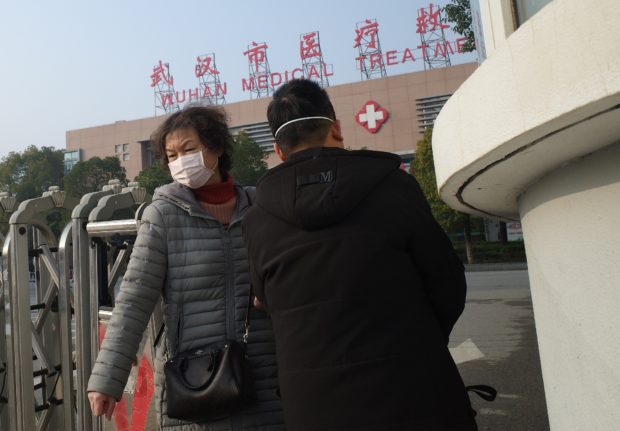China says WHO coronavirus experts to visit from Thursday

This file photo taken on January 12, 2020 shows a woman (L) leaving the Wuhan Medical Treatment Centre where a man who died from a respiratory illness was confined, in the city of Wuhan, Hubei province. Photo by Noel Celis / AFP
BEIJING — Ten World Health Organization scientists will visit China from Thursday to probe the origins of Covid-19, authorities said Monday, more than a year after the pandemic began and amid accusations Beijing has tried to thwart the investigation.
The long-awaited mission is of great political significance at a time when the coronavirus pandemic has devastated the world, caused almost two million deaths, and brought the global economy to a virtual standstill.
The WHO team “will conduct joint research cooperation on the origins of Covid-19 with Chinese scientists”, the National Health Commission said in a statement that provided no further details.
A last-minute delay to the mission earlier this month earned China a rare rebuke from the head of the WHO.
Director-General Tedros Adhanom Ghebreyesus said he was “very disappointed” China had not authorized the team’s entry — especially as two members were already en route.
Article continues after this advertisementBeijing sought to downplay the tension, however, with foreign ministry spokeswoman Hua Chunying calling it a “misunderstanding”.
Article continues after this advertisementThe WHO experts will have to quarantine for two weeks on arrival, but are expected later to visit Wuhan — the city where the deadly virus was first detected in late 2019.
Virus origins
The US and Australia have led international calls for an independent inquiry into the origins of the virus, putting China under significant pressure amid growing calls for accountability.
Beijing has faced international criticism over its lack of transparency during the initial outbreak, although domestically the government has praised its own handling of the outbreak and stifled any criticism.
Government officials have repeatedly said that tracing the origins of the pandemic was a “scientific matter”, and has even pushed theories it originated outside China.
Experts say solving the mystery of how it first jumped from animals to humans is crucial to preventing another pandemic, but China’s tight control of its scientific research leaves little hope of finding definitive conclusions.
There is little dispute that the virus emerged in late 2019 at a wet market in Wuhan where wildlife was sold as food, and the pathogen is believed to have originated in an undetermined bat species.
The quest to detect its origins has also been plagued by conspiracy theories — amplified by US President Donald Trump — that it leaked from a Wuhan virology lab.
For more news about the novel coronavirus click here.
What you need to know about Coronavirus.
For more information on COVID-19, call the DOH Hotline: (02) 86517800 local 1149/1150.
The Inquirer Foundation supports our healthcare frontliners and is still accepting cash donations to be deposited at Banco de Oro (BDO) current account #007960018860 or donate through PayMaya using this link.














